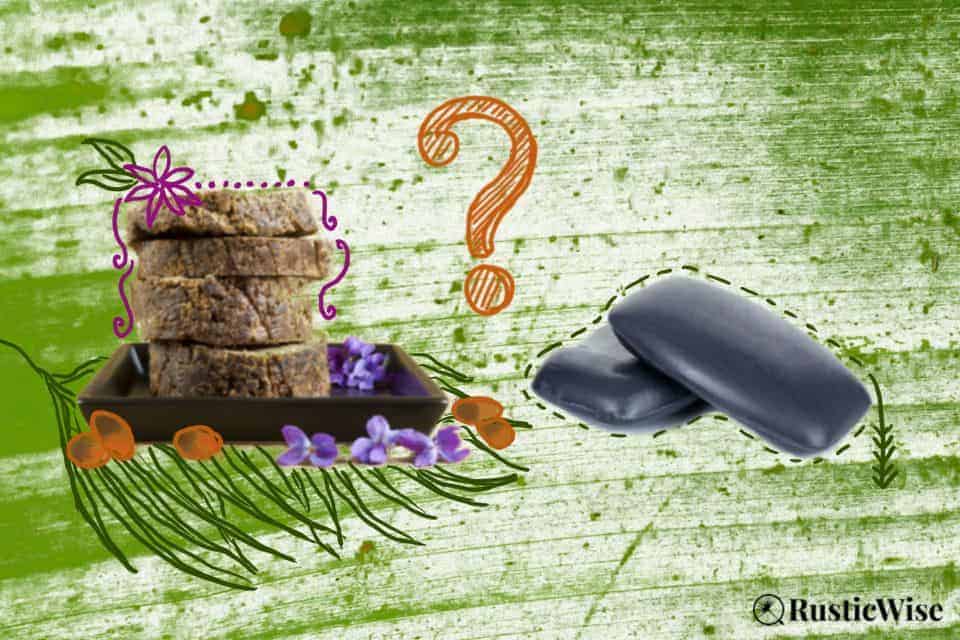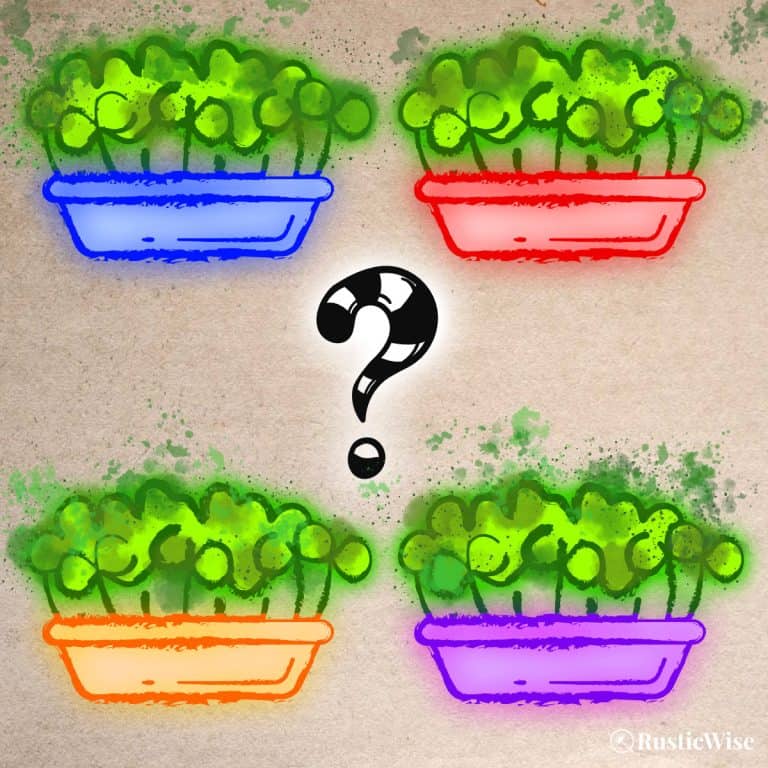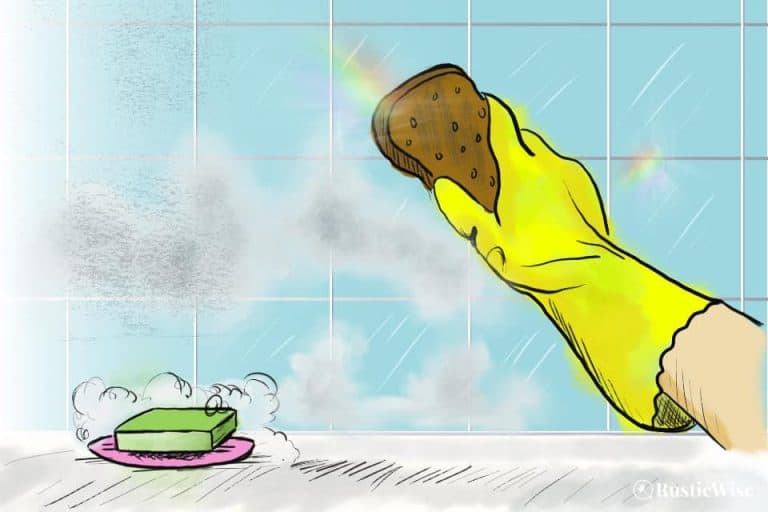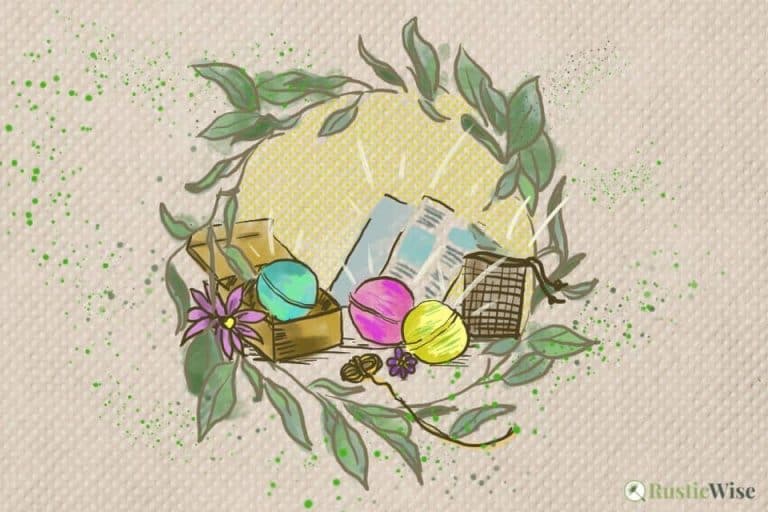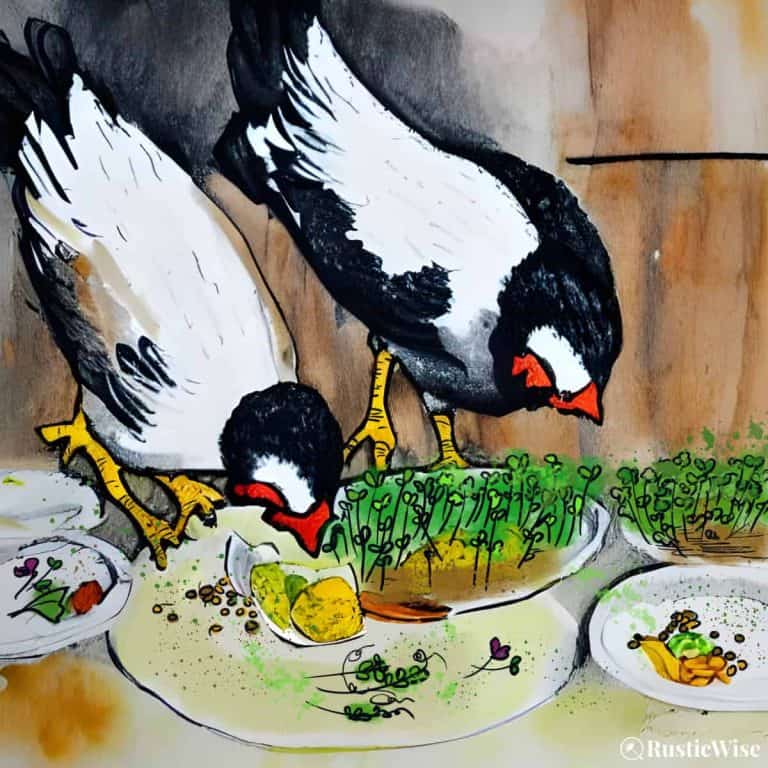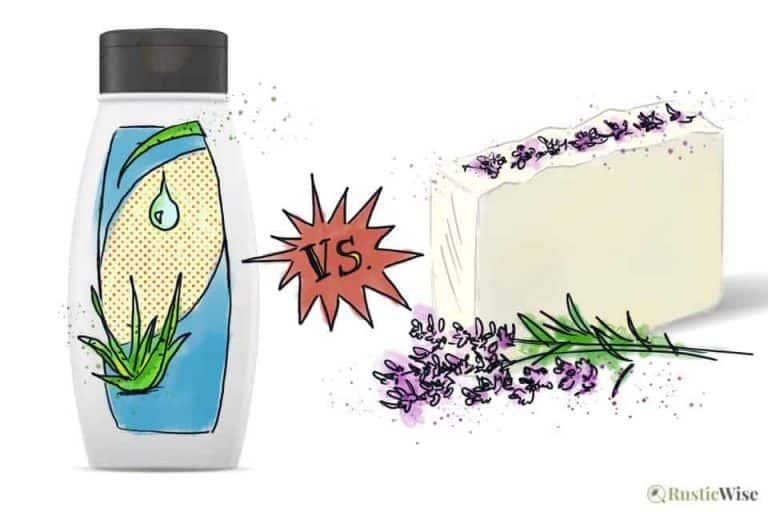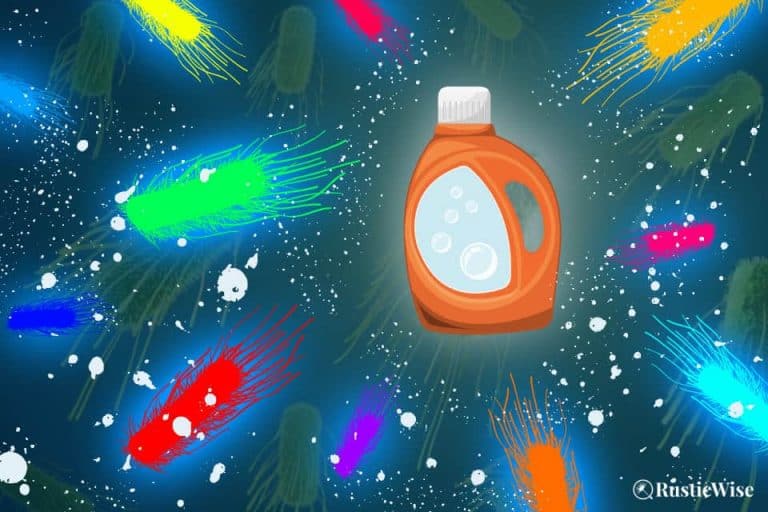Real African Black Soap vs. Fake: How To Spot the Real Deal
RusticWise is supported by its readers. When you purchase through links on our site, we may earn an affiliate commission. As an Amazon Associate, we earn from qualifying purchases. Thank You!
You might have heard the buzz about African black soap. It’s a bar of traditional natural soap that has many purported skin nourishing benefits from treating acne, banishing fine lines to moisturizing the skin. It should come as no surprise then that many companies are selling knockoffs. We’ll show you how to spot real African black soap vs. fake versions.
Real black soap isn’t actually black. As it’s made from traditional methods, the color ranges from various shades of brown to beige, and sometimes gray. Real African black soap is textured, while the fakes are smooth.
If you’re looking for a back-to-basics approach for your beauty regime, this beauty bar might be what you’re looking for. To prevent you from getting duped into buying a fake version of black soap, we’ve rounded up a few tips on how to distinguish the real deal from a phony.
What is African black soap?
Women from west Africa (mainly Ghana and Nigeria), have produced a plant-derived natural raw soap for generations. Depending on the specific region in which they produce the soap, the formulations and names may vary.
In Ghana, locals refer to the soap as alata samina or anago samina. In Nigeria, they call the soap ose dudu; the name comes from the Yoruba people of west Nigeria and it translates to “black soap.”¹
The soapmakers collect, and dry plantain skins, and/or cocoa pods to dry under the sun. They burn these organic materials to ashes which produce potash lye.²
This natural lye is combined with plant-based oils such as locally produced palm kernel oil (PKO) or palm oil (derived from the palm fruit). Sometimes the women add other ingredients too, such as coconut oil, unrefined shea butter, palm leaves, or local honey.
Next, the soap ingredients are combined and heated in a large pot for a period of time and poured into molds to dry. (From what I know about soap making, this sounds similar to the hot process method of making handmade soap that many crafters still use today.)
Note: Many types of raw African black soap contain remnants of plantain skins, shea tree bark, cocoa pods, or palm leaves. Because of this, use caution and avoid applying the bar soap directly onto skin.
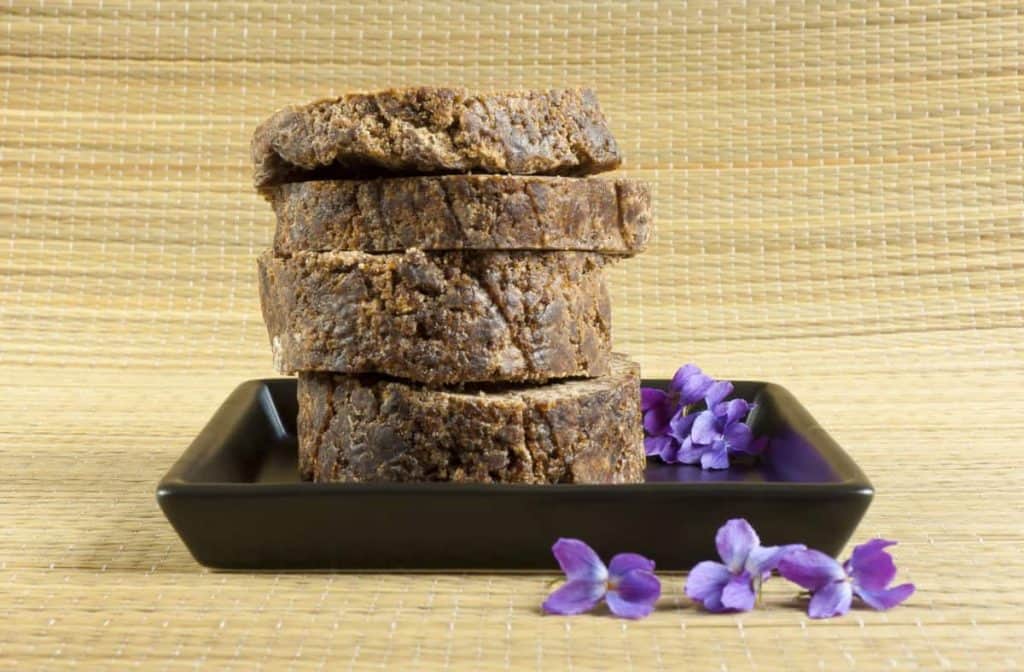
Credit: 123RF.com
Hot to spot real African black soap vs. fake black soap
Look up “African Black soap” on Amazon or Etsy. You’re bound to find a myriad of options. Some sellers simply add black artificial color to a soap base and call it a day—instant “black” soap.
Others may take a bar of real African soap and melt it down to add other filler ingredients.
Here’s what to look for to differentiate between real African black soap vs. fake varieties.
Texture
The first thing to look at is the texture of the soap. It should appear slightly rough and “rustic”—not smooth.
As the traditional soap is handcrafted and cooked, the finished soap surface will be slightly uneven. This is common in all soaps produced using this method: the soap looks handmade.
Edges are not smooth. The surface is slightly bumpy. If your bar of “black soap” is silky smooth to the touch, something’s off.
Color
Real black soap isn’t actually completely black. As it’s made from natural ingredients and traditional methods, there’s bound to be some color variation. Even if you buy several bars of soap from the same producer, the colors may look slightly different from bar to bar.
The natural colors from the burnt plantain skins or cocoa pods have natural variation. The length of time the oils and plant ashes are combined for also affects the final coloring.
The colors in authentic black soap run the gamut from beige to varying shades of brown, gray, and bits of black.
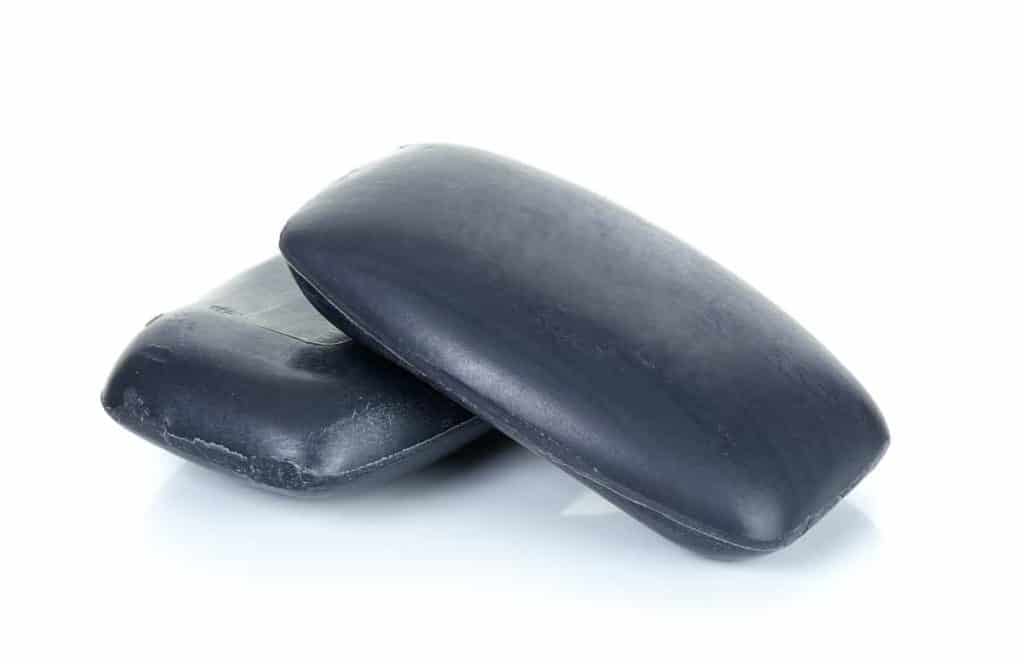
Credit: 123RF.com
Soft soap
Unlike a regular bar of soap, which is firm and smooth, real black soap isn’t like that. Instead, true African black soap has a softer consistency, which can easily break apart. When wet, the soap has a putty-like texture.
The softness comes from the way they make the soap. The combination of water and burnt ashes of cocoa pods (or plantains) produces potash lye, also known as potassium hydroxide (KOH). Soap bars made with potash lye are softer.
On the other hand, the hard bars of soap most of us are accustomed to are produced with another form of lye, sodium hydroxide (NaOH).
Check for artificial ingredients
Check the ingredient lists on the soap. An authentic natural raw black soap should have few ingredients. The ingredients should be natural with no artificial colors or synthetic fragrances.
While there are varying recipes for black soap, most authentic products comprise: palm kernel oil, coconut oil, husks from cocoa pods, unrefined shea butter, plantain skin ash, and water.
Tip: Look for products labelled Fair Trade. The artisans (mostly women) who craft soap typically live in impoverished communities. This ensures the women who craft the soaps are paid fair prices and can then support their families and communities.
You might like
Best Raw Organic African Black Soap, for Dry Skin and Skin Conditions
- 100% pure & natural.
- Imported from Ghana.
- Great for treating acne, eczema, dry skin, psoriasis, and scars.
Found on Amazon
Check Current Price
Those in Canada and the UK should be taken to the product listing in your region.
Benefits of African black soap
Part cleanser, part moisturizer, part wonder bar—here are a few benefits of this natural soap.
Antimicrobial and antifungal properties
A 2018 study conducted by researchers at the Federal University of Technology in Akure, Ondo State, Nigeria compared locally produced black soap with commercially produced medicated soaps and their relative efficacy against pathogens (bacteria and fungi).
The results found that traditional black soap fared better than the medicated soaps in terms of their efficacy in preventing bacterial or fungal growth.
Researchers concluded:
“The antimicrobial activities exhibited by black soap could be attributed to the presence of its unique bioactive constituents such as fatty acids, high level of UV-B absorbing triterpenes esters, Vita-mins, phytosterols, compesterol, stigmasterol, beta and alpha-spinosterol which signifies the potential of the soap as a topical therapeutic agent.”
The takeaway: Black soap is found to protect the skin from various forms of bacteria and fungi. This makes it a good topical treatment for acne, eczema, dandruff and dry scalp.
Rich in vitamins
A rich source of vitamins A and E, authentic African soap helps keep skin firm and smooth. Vitamins A and E are powerful antioxidants which help to combat signs of skin damage and aging. These vitamins help reduce fine lines, minimize dark spots, and diminish razor bumps (from shaving).
Moisturizing
Glycerin is a natural byproduct of soaps produced in the traditional way, and black soap contains plenty of it. Glycerin acts as a humectant which draws and retains moisture on skin.
Gently exfoliating
Raw African soap may contain small pieces of plantain, palm leaves, pieces of shea tree bark, or husks from cocoa pods—all of which act as a gentle exfoliant.
Tip: To prevent scratches on the skin, it’s recommended you lather the soap in a loofah or a washcloth first, instead of applying the bar directly to your face or body.
Key ingredients in African black soap
How to make your African black soap bar last longer
Unlike most other soap bars, the authentic version of black soap is soft. As such, it requires a bit of TLC. Store your beauty bar in a cool, dry place. Allow it to dry fully between uses (you can give it a quick wipe with a washcloth after each use.)
To make your bar soap last longer, cut off a small piece for use, and store the rest away.
Related questions
What’s activated charcoal used for in soap?
Sometimes you’ll see black bars of soap that contain activated charcoal. Charcoal lends a dark or black color to soap. These are different from African black soaps.
Activated charcoal is a natural additive that works similar to clays in soap making—it draws out impurities in skin. Charcoal soap bars are great for removing dirt or oil from skin making it ideal for oily skin.
New to making soap? 🧼❓
👉We have a fantastic overview on the whole soapmaking process here: read our Timeless Guide To Soapmaking.
If you would like to see our soapmaking posts organized by topic type, see our Soapmaking Collection.

References
- Adebayo OC., et al. “Comparative Antimicrobial Efficacy of Locally Made African Black Soaps Produced in Akure, Nigeria and Medicated Soaps Against Selected Clinical Skin Pathogens”. Acta Scientific Microbiology 1.3 (2018): 33-37.
- African Fair Trade Society, African Black Soap: Fascinating History, Types & Skin Benefits, https://www.africanfairtradesociety.com/blogs/blog/african-black-soap-fascinating-history-types-skin-benefits. Accessed January 2022.

Author: Theresa Tesolin
Theresa is co-founder of RusticWise. She helps people unleash their inner DIY spirit by encouraging them to get dirty and make or grow something from scratch.

